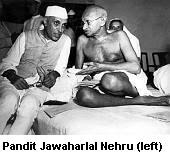At its second meeting in March there was disagreement between the Muslim League on the one hand and the Hindu Mahasabha and Sikhs on the other. In the third meeting of this committee that a ‘small committee viewing the communal problems as a whole…might succeed in finding a way out’.
A committee was formed with Motilal Nehru as chairman to consider and determine the principles of the Constitution for India. The report of this committee came to be known as the Nehru report. At the fourth meeting of the conference Motilal Nehru presented the report of his committee.
The report opted for the Dominion Status for India bearing in mind that it was what the majority of the parties in India would prefer. Fundamental rights were guaranteed, rationalizing that if religious and cultural freedom were given to the minority communities, it would resolve the communal problem. There were to be two houses of the Parliament, the Senate and the House of Representatives. The Senate would consist of 200 seats, each province to be represented in proportion to their population whereas the House of Representatives would contain 500 seats and be unicameral. Both the Houses were to be elected by universal suffrage. The Muslims’ demand for one-third of the seats in the Central Legislature was rejected. Separate electorates, which were the aspirations of the Muslims, were also eliminated. The report conceded the demand that Balochistan and NWFP should have the same status as any other province of India and also agreed to the separation of Sind from Bombay despite the protest of the Hindus of Sind.
The Muslim League held their 20th session in Calcutta on December 20, 1928. It was decided there that a delegation including Jinnah would attend the conference convened by the Indian National Congress to review the Nehru Report. The report was presented for final approval to an All- Parties National Convention which opened on December 22, 1928.
Jinnah proposed 4 amendments to the report on December 28:
1. There should be no less than one-third Muslim representation in the Central Legislature.
2. In event of the adult suffrage not being established, Punjab and Bengal should have seats reserved on population basis for the Mussalmans.
3. The form of the constitution should be federal with residuary powers vested in the provinces. This question is by far the most important from the constitutional point of view.
4. With regard to the question of separation of Sind and the NWFP, we cannot wait until the Nehru Constitution is established…The Mussalmans feel that it is shelving the issue and postponing their insistent demand till doomsday and they cannot agree to it.
M.R Sapru who was a leader of the Hindu Mahasabha said that Jinnah was “…a fearless and lucid advocate of the small minority of Muslims whose claim he has put forward in the course of his speech.”
Jinnah’s proposals were rejected when put to vote. The majority of the Muslims rejected the Nehru Report. Instead of uniting the Indian communities, the report had exposed their divisions. The Nehru Report unknowingly laid the groundwork for the making of Pakistan because it was so clearly against the intrest og Muslims. Muslim leaders like Jinnah and the Ali brothers who had till then supported the Congress to a certain degree were gravely disappointed and since they had great stature among on the Muslim masses, the Muslims in general also started distrusting the Congress and the Indian society was polarized further.
In the December 1929 session of the report one of the resolutions declared that the entire scheme of the Nehru report had lapsed.


Tidak ada komentar:
Posting Komentar